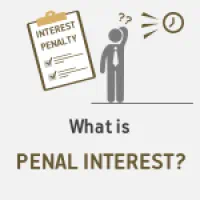
What is Penal Interest?
Penal interest is an extra fee charged by lenders if the borrower misses particular conditions of a loan agreement usually missed payments or noncompliance with repayment terms. It is added over and beyond the normal rate of interest.
For instance, if your normal loan interest rate is 10% and penal rate of interest is 2%, then at the time of delay or default, you might be charged 12% on the outstanding amount until you clear it.
What Is the Penal Rate of Interest?
The penal rate of interest is the percentage rate added to the initial rate of interest as a penalty. The rate is defined in the loan contract and is different depending on the lender and type of loan. It’s not equivalent to the base interest rate it’s an additional rate that aims to stimulate timely payment and compensate for the risk or hassle involved in the delay.
Penal Charges Meaning
Penal charges are monetary fines levied for loan term violation. They could be late payment charges, default fees, or interest penalties (penal interest). They’re meant to discourage borrowers from missing payments or committing loan condition violations.
-
Penal charges in most instances are determined as:
-
Penal Interest = (Outstanding Amount) x (Penal Rate of Interest) x (Delay Period)
These fees are normally stated explicitly in loan contracts, so it is important to go through the terms and conditions prior to signing.
Penal Interest Rate in India
The Reserve Bank of India (RBI) has made penal interest rates more transparent and equitable in India. Under recent RBI directions, banks need to:
1. Explain penal charges distinctly apart from the rate of interest.
2. Desist from compounding penal interest (i.e., charging interest on interest).
3. Not employ penal interest to drive more revenue but merely to implement discipline.
This means borrowers are better protected from unfair penalties, but it’s still vital to stay on top of repayment schedules.
Conclusion
Knowing penal interest, penal interest rate, and penal charges protects you from incurring unnecessary charges and keeping your credit record good. Always review your loan papers thoroughly, familiarize yourself with your payment deadlines, and speak to your lender if you are unable to pay on time. Being informed is your best line of defense against unnecessary financial charges.